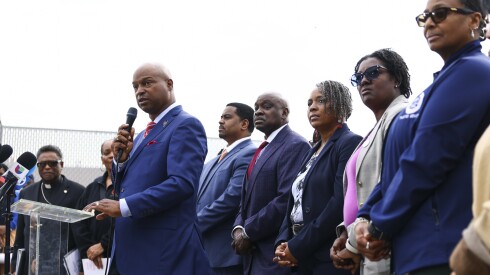State lawmakers head to Springfield Tuesday with a full agenda for their fall veto session as Illinois residents deal with rising energy bills, a looming mass transit crisis and an influx of federal immigration agents.
That might not leave much legislative bandwidth for Mayor Brandon Johnson to get any help plugging a $1.15 billion city budget hole — or for the Bears to find enough blockers in their rush for a new stadium in Arlington Heights.
Lawmakers are scheduled for session through Thursday before returning to close out the legislative calendar Oct. 28-30. Here’s a look at the big issues facing the Illinois General Assembly.
‘ICE out’
As federal authorities ramp up deportation efforts, Democrats who control both chambers in the statehouse are exploring how to block Immigration and Customs Enforcement agents from more of the spaces where they’ve rounded up Illinois residents in recent weeks.
The state already bars local law enforcement from assisting federal authorities unless they have a warrant, but so-called “ICE out” measures would aim to prohibit deportations from being carried out in hospitals, schools, state universities and other sites.
It’s not clear how such legislation could be enforced, but Illinois House Speaker Emanuel “Chris” Welch said his caucus members are working it out.
“If we can keep them out of courts and the areas around the courts, and we can do that properly, I would love to do that,” Welch said.
In response to other ripple effects from the Trump administration, lawmakers could also try to find ways to disconnect parts of the state’s tax code that are tied to federal code that is set to deliver large corporate tax breaks under Trump’s “One Big Beautiful Bill.” Last week, state analysts projected a $2.2 billion state budget deficit looming next year due largely to federal cuts.
Transit talks back on rails
The Senate passed a bill in the spring to reform Chicago area transit governance and impose a $1.50 package delivery tax to fund the CTA, Metra and Pace beyond the fiscal cliff that looms next year as federal COVID-19 relief dollars dry up.
But the bill was dead on arrival in the House, and it won’t get any easier for lawmakers to swallow an unpopular tax five months ahead of the primary election.
Agency leaders say the fiscal cliff isn’t as big as originally thought — shrunk down from $770 million in part with planned fare hikes — but it’s still a $202 million gap that lawmakers have to deal with heading into another brutal budget season.
Senior mayoral adviser Jason Lee said a mass transit funding fix is Mayor Johnson’s “biggest priority” in the veto session, though he acknowledged it could get punted into the new year.
“We don’t need a preferred revenue source for transit. We just need a commitment from them to work out an agreement,” Lee told the Sun-Times. “We’re trying to make sure that they come up with the best solution that delivers resources for CTA and all of the other regional transit agencies.”
A transit fix is likely the best Johnson can hope for this session, as he hasn’t made headway on the other “progressive revenues” he has sought from Springfield that would help him erase a $1.15 billion city budget shortfall. That includes potential taxes on services, digital advertising, corporate income and high-end real estate transactions.
New spark for energy bill
Electric bills shot up over the summer due to increased power demand from big data centers sucking up vast amounts of energy.
Lawmakers were on the cusp of passing legislation in the spring aiming to spur development of wind and solar power as well as large batteries to store energy to stave off a shortage and rein in household costs. But the effort collapsed under opposition from business groups that argued it was too expensive.
State Sen. Bill Cunningham, the Southwest Side Democrat who has shepherded energy talks, has said business and environmental groups are close to a deal, but some parties have pushed to extend talks into next year.
Bears stadium scrum
Bears president Kevin Warren is looking to end his Springfield shutout after years of failed lobbying efforts for legislation that would freeze property tax assessments for massive projects — like their proposed stadium in Arlington Heights — at a discount negotiated with local taxing bodies.
Gov. JB Pritzker has said he’s open to the idea of such “megadevelopment” legislation, but insists the Bears need to find a way to pay off some $534 million that taxpayers are still footing for the 2003 renovation of Soldier Field.
Lee said Johnson is not asking the Chicago delegation to block bills that would smooth the team’s path to the suburbs — the mayor simply wants Chicago to be “treated fairly.”
“If Springfield wants to support stadiums, we want Chicago to get the same level of support,” Lee said.
The McCaskey family should temper their expectations, according to a spokesman for Senate President Don Harmon, who wryly suggested the team consider this session a “bye week.”
